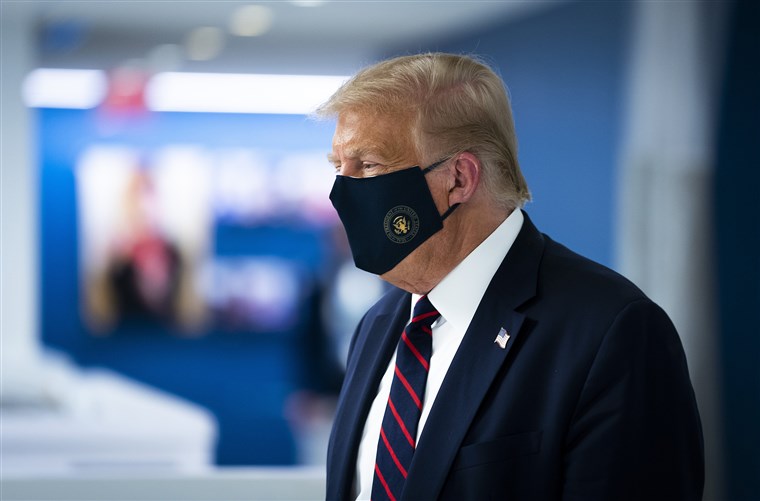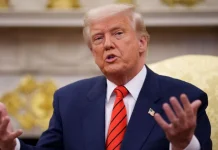Mask compliance has sparked debates throughout the pandemic as Americans received mixed messages from authorities over whether they should wear face coverings in public places.
The Centers for Disease Control and Prevention has said for months that wearing masks slows the spread of COVID-19, but meanwhile, politicians have been called out not doing so. As the nation edged further into the stay-at-home era, viral videos of conflicts over mask requirements at businesses have become common to see.
But with President Donald Trump and first lady Melania Trump testing positive for COVID-19, will shoppers be more willing to mask up before heading into a store?
Experts told USA TODAY that while they hope shoppers will be more compliant, it depends on several factors if there will be a lasting impact.
“For the next seven to 10 days, I think there will be an uptick in all sorts of prevention and safety behaviors – so more people buying masks, more people wearing masks, more people using hand sanitizer, more people respecting social distancing,” said Kelly Goldsmith, an associate professor of marketing at Vanderbilt University.
Yet Goldsmith says it can depend on the severity of the president’s symptoms.
“If he actually fares just fine and maybe has very mild or no symptoms, I think the pendulum can swing in the opposite direction where that’s going to validate all the people that already believe this has been overblown,” she said.
As of Friday afternoon, it was being reported that the president was experiencing “mild symptoms,” had a low-grade fever and was being taken to Walter Reed National Military Medical Center in what aides said was a precautionary move.
Dr. David Abrams, professor of social and behavioral science at New York University, hopes Trump’s diagnosis might convince people that wearing masks is important and gets the doubters to start listening.
“But given the massive mixed messages of leadership, I doubt it will make a big difference because things have become so politically polarized,” he said. “The rational views of science have been completely undermined.”
For Chris Nelson of Fort Lauderdale, Florida, the president’s positive diagnosis doesn’t change his stance on masks.
“Absolutely not,” Nelson said about if he thinks differently about masks. “There’s nothing that can relate him getting COVID-19 to not wearing a mask.”
Nelson organized an anti-mask flash mob in mid-September at a Target in South Florida, which garnered national attention and a scolding from Twisted Sister’s Dee Snider for use of the band’s 1984 hit song “We’re Not Gonna Take It.” Several of the protestors were wearing “Make America Great Again” gear.
Health officials have backed masks with CDC Director Robert Redfield telling a Senate panel last month that a vaccine may not be available to the American public until summer or fall 2021 and masks are “the most important, powerful public health tool we have” – possibly even more effective than a vaccine.
The president has rarely worn a mask in public. While he has occasionally endorsed their use, he also has openly questioned their effectiveness and mocked Democratic opponent Joe Biden, who regularly wears a mask, for wearing them.
“I don’t wear masks like him,” Trump said of Biden during the presidential debate on Tuesday. “Every time you see him, he’s got a mask. He could be speaking 200-feet away from – and he shows up with the biggest mask I’ve ever seen.”
Biden tweeted Friday that he and his wife, Jill, have tested negative for COVID and, in thanking supporters for their concern, said, “I hope this serves as a reminder: wear a mask, keep social distance, and wash your hands.”
Masks required
Around mid-July, the nation’s largest retailers including Walmart, Target and Kroger announced mask requirements in July at all locations throughout the country.
Yet even though signs are posted at store entrances, there isn’t always compliance and there have been confrontations with maskless shoppers.
Both the Retail Industry Leaders Association and National Retail Federation have encouraged mask policies to protect shoppers and employees.
“Retailers are alarmed with the instances of hostility and violence front-line employees are experiencing by a vocal minority of customers who are under the misguided impression that wearing a mask is a violation of their civil liberties,” Brian Dodge, the retail association’s president, said in a July letter to the National Governors Association.
In late August, the CDC released new guidance for businesses operating during the pandemic: Don’t argue with shoppers not wearing masks.
“Don’t argue with customers if they make threats or become violent,” the CDC advised in the recommendations aimed at curbing the violence that occurs when some people don’t want to follow COVID-19 prevention policies. “Don’t attempt to force anyone who appears to be angry or violent to follow COVID-19 prevention policies.”
In a statement to USA TODAY, Marc Perrone, international president of United Food and Commercial Workers Union, said it’s time to protect frontline workers in grocery stores and essential businesses.
“A strong national agenda for workers must include hazard pay for the risks these workers are facing, a national mask mandate to slow the spread of COVID-19, increased access to COVID-19 testing and personal protective equipment, and enforcement of clear safety standards for all essential frontline workers for as long as this pandemic continues,” Perrone said.
Shoppers’ mask habits
According to a Pew Research Center survey from August, more than 85% of U.S. adults say they regularly wear a mask or face covering in stores and other businesses most of the time up from 65% in a June survey.
Some shoppers feel more comfortable when masks are required.
A recent Harris Poll survey about businesses mandating masks found that 76% of Americans wanted businesses to “exact and enforce” their own mandatory policies, with 80% saying they were more likely to do business with a company if they required all customers and employees to wear a face mask.
Abrams said there should be consequences for not wearing masks when required like seatbelt rules and needing a shirt and shoes to enter a business.
“Retail stores have every right to say if you are not wearing a mask please leave,” he said. “This is a life-and-death issue. Masks, physical distance and hand washing are the three things we have to reduce the spread of the virus in the absence of a vaccine.”
Can stores and restaurants require masks?
Yes. Local governments can decide what safety measures to impose on businesses, but individual businesses can institute further restrictions. Many governors instituted or renewed orders requiring people to wear face coverings in public. Most of the orders require people to wear masks in both indoor and outdoor public spaces where social distancing isn’t possible, but some apply to only specific places or age groups.
Should kids wear masks?
According to the CDC, cloth face coverings should not be worn by children younger than 2. Older children can and should wear masks, experts say. Schools across the nation are requiring masks when social distancing isn’t possible.
Are people with disabilities required to wear masks?
According to the Southeast ADA Center in Atlanta, which provides training and guidance on access, if “a person with a disability is not able to wear a face mask, state and local government agencies and private businesses must consider reasonable modifications to a face mask policy so that the person with the disability can participate in, or benefit from, the programs offered or goods and services that are provided.”
Reasonable modifications listed include allowing customers to order with curbside pickup, offering appointments and face shields instead of face masks, the center said in a disability issues brief. Businesses may not have to offer services if they would require a fundamental change in the business model or create an undue burden or if a person poses a direct threat to the health of others.
“A state or local government agency or private business may not have to provide a reasonable modification to the face mask policy if the individual with a disability poses a direct threat to the health or safety of others,” the brief also notes.
When should masks be worn and what kind?
The CDC recommends wearing masks in public settings around people who don’t live in your household and when you can’t stay 6 feet away from others to “help stop the spread of COVID-19 to others.”
The agency’s mask recommendations for types of face coverings include:
- Wear masks with two or more layers to stop the spread of COVID-19.
- Wear the mask over your nose and mouth and secure it under your chin
- Masks should be worn by people 2 years and older
- Masks should not be worn by children younger than 2, people who have trouble breathing, or people who cannot remove the mask without assistance
- The CDC does not recommend the use of gaiters or face shields and says evaluation “of these face covers is on-going but effectiveness is unknown at this time.”












